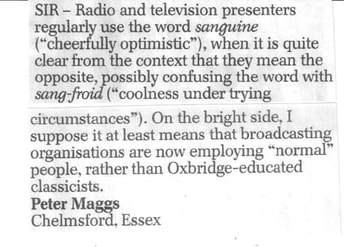 I make no apology for reproducing my rather smug letter to The Daily Telegraph of 25 March 2011, (although I’m horrified to note that it was more than eight years ago). And lest anyone is under any illusion, I stopped buying said organ some time since as a protest against its appalling political bias. I’ll admit to photographing the Friday puzzles from copies I can find whenever possible, since they are rather good on that day. I raise this again now, because more and more I hear the word sanguine being used incorrectly in the media – exactly as I point out in the letter – with the clear meaning entirely opposite to that meant. Am I just being an anorak? Is this Jacob Rees-Moggery taken to ridiculous extremes? (He recently pulled up an interviewer who had accused the government’s strategy as being a ‘shambles’, by questioning why government activity was being compared with a butcher’s slaughterhouse – which is the original meaning of ‘shambles’.) Well, I think it is worthwhile to try and maintain some standards in the use of our principal method of communication, and if you don’t agree, I challenge you to listen to any conversation among young people (and some older, who ought to know better), and try to identify a single sentence without the words ‘like’ or ‘kind of’ … The word sanguine comes from one of the four humours – deriving from bodily fluids – identified by the Greeks 2,500 years ago. This word, and its three associated words, remains a useful way to describe human temperaments. Thus: Sanguine – cheerfully optimistic, Choleric – bad tempered or irritable, Melancholic – deeply sad, and Phlegmatic – unemotional and solidly calm. Use the term incorrectly, and the idea being expressed is meaningless. It’s a poor example of the importance of the meaning of words, but I used regularly to visit a German company making high-power lasers. Their handbook – printed in English – stated that for testing the output of a laser, it was most important to use a target that was inflammable(!) They had made the thoroughly logical – but totally incorrect – assumption that ‘in’ flammable meant ‘not’ flammable. I wonder how many insurance claims were refused for the fires resulting from users taking that instruction literally. (I have decided not to mention by name the bodily fluids involved, since people might be reading this at meal times … If you’re interested, you can find them in Wikipedia)
0 Comments
Leave a Reply. |
AuthorWelcome to the Mirli Books blog written by Peter Maggs Archives
March 2024
Categories |
 RSS Feed
RSS Feed